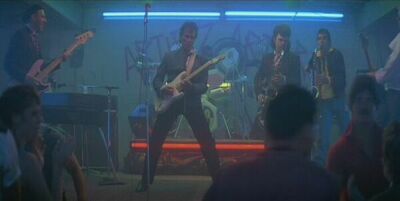The music played over the ending credits is generally referred to as the
"Team March" and was composed by Michael Boddicker, who did the
soundtrack for TABB, his first complete motion picture score.
He composed and performed the music in his extraordinary state-of-the-art
recording studio, which is full of all the latest in digital and analog synthesizer
equipment. Many of Boddicker's "instruments" are so advanced they aren't
yet available on the open market.
Besides composing the catchy theme and score for the film, Boddicker
provided many weird sound effects, most notably for the arrival of the alien
thermopod on Earth.
Boddicker is a composer (formerly a studio keyboard/synth player) and played synth on many pop, R & B and
jazz LPs, among them those of Celine Dion, Joao Gilberto and Flora Purim.
He also won a Grammy in 1983 for his song "Imagination" on the soundtrack
to "Flashdance" was a player on "We Are The World."
Boddicker has a stellar reputation as a synthesizer performer for Michael Jackson, Lionel Ritchie, Sheena Easton, Manhattan Transfer, Donna Summer, Al Jarreau,
Earth, Wind & Fire, Randy Newman and Quincy Jones, among many others.
Boddicker has also contributed many original compositions to films, including the
original score for "Get Crazy" and songs and compositions for "Flashdance,"
"Outland," "Xanadu" and "Battlestar Galactica." His recordings include the Grammy-
winning "Imagination" on the "Flashdance" soundtrack, "Starscape" on the "Get
Crazy" soundtrack and contributions to albums by Patti Austin, Lani Hall, and
John Ford Coley. Boddicker has also composed music for television shows, advertising and advertising for film.



